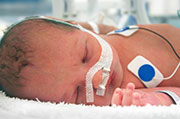
MONDAY, Aug. 11, 2014 (HealthDay News) — Extremely premature babies are less likely to develop infections when medical staff wear gloves after washing their hands, compared with just hand washing, a new study finds.
Researchers looked at infections and cases of so-called necrotizing enterocolitis — tissue death in the intestines — among 120 extremely preterm babies in a neonatal intensive care unit at one hospital.
The infants were younger than 8 days old and weighed less than 1,000 grams (2 pounds, 3 ounces) and/or were delivered before 29 weeks of pregnancy. Sixty of the infants were cared for by medical staff who wore nonsterile gloves after hand washing, while the other 60 were cared for by medical staff who used hand washing alone.
Late-onset infections (more than 72 hours after birth) or necrotizing enterocolitis occurred in 32 percent of infants in the hand washing/gloves group and in 45 percent of those in the hand washing-only group, the investigators found. The infants in the hand washing/gloves group also had 53 percent fewer gram-positive bloodstream infections and 64 percent fewer central line-associated bloodstream infections.
The findings show the need for further research to assess the use of gloves after hand washing in order to prevent infections in preterm infants and other patients, concluded Dr. David Kaufman, of the University of Virginia School of Medicine, and colleagues.
Their study was published online Aug. 11 in the journal JAMA Pediatrics.
While the results are promising, further research is needed to fully evaluate the use of gloves after hand washing, Dr. Susan Coffin, of the University of Pennsylvania, wrote in an accompanying editorial.
“It is important to recognize that universal glove use might lead to several unintended consequences. Glove use has been found by many investigators to be one of the key barriers to appropriate hand hygiene,” she noted.
More information
The March of Dimes has more about the NICU.
Copyright © 2026 HealthDay. All rights reserved.

